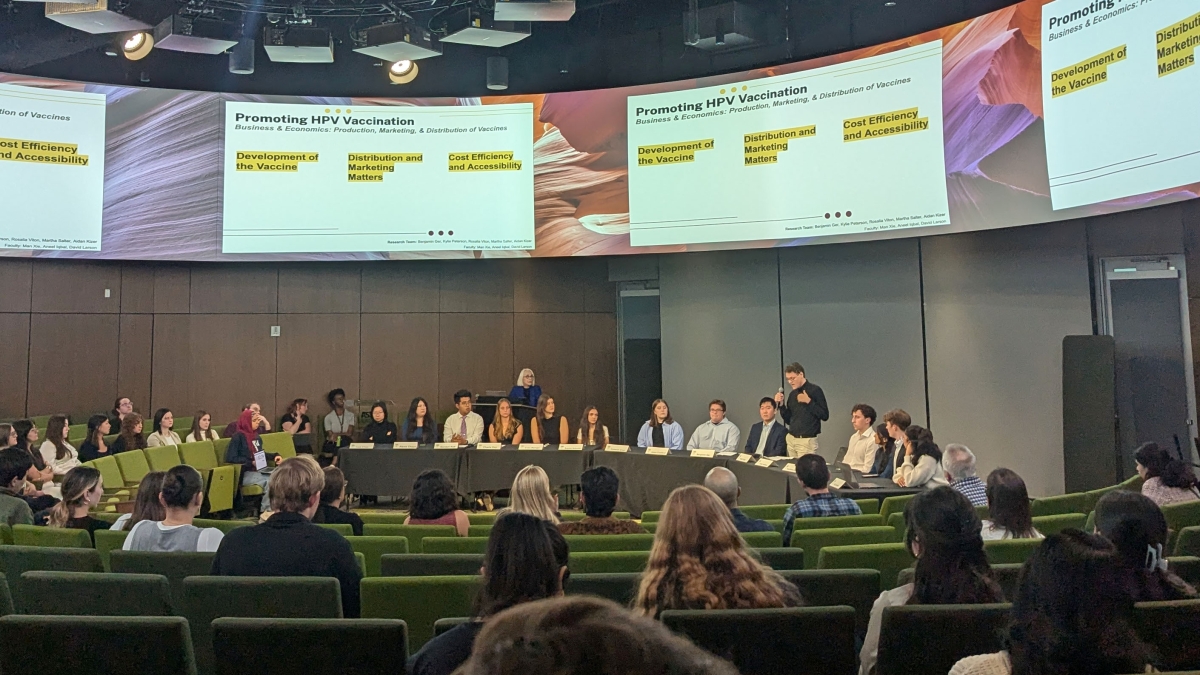The task of redesigning Arizona State University’s College of Health Solutions from an institution of disparate departments to one of translational networks was no small feat. But it’s what leaders foresaw as a necessary step toward bringing it to a place where it could better serve the community it inhabits — one of the cornerstones of ASU’s charter.
In the midst of a global crisis, what that looks like is experts coming together from a variety of fields to conduct research that has the potential for real, measurable impact. Not ones to disappoint, when College of Health Solutions Dean Deborah Helitzer put out a call to faculty to submit ideas for pilot studies that would address the innumerable consequences of the pandemic, almost 20 teams responded with proposals.
“When we re-formed, we re-formed around the idea that we would focus on disease prevention and that we would bring all of our transdisciplinary focuses in both research and education to the table,” Helitzer said. “And we’ve done that in little ways, chipping away at it here and there, but COVID-19 really gave us the opportunity to do that with abandon. It’s a good opportunity to enact the vision of the college, and it’s become something that has really galvanized the faculty.”
In the end, a total of $100,000 was dispersed among five teams to fund research into such areas as the pandemic’s effect on opioid use disorder treatment, a distinctly local concern in Arizona, where Gov. Doug Ducey declared opioid use a statewide health emergency in 2016.
“We’re seen as the translational arm of ASU,” Helitzer said of the college. “What we do is implement research findings in the community to make a difference.”
Scott Leischow, College of Health Solutions professor and director of translational research for the college, remarked that leadership was impressed with the diverse scope of the projects.
“We are pleased that the range of projects funded reflects the complexity of COVID-19, including an understanding of the nature of the virus itself, how health care systems are adapting and how individuals are striving to cope with the dramatic life changes brought about by COVID-19,” he said.
The five teams and their proposed projects are:
COVID-19 pandemic response with electronic health record and patient-reported measurement
- Rodger Kessler, research professor, College of Health Solutions
- Mindy McEntee, postdoctoral scholar, College of Health Solutions
- Brad Doebbeling, professor, College of Health Solutions
The COVID-19 pandemic amplifies the importance of current and ongoing surveillance of patients and families directly affected by the virus, and those at high risk for infection. There is also a large population of patients who may not get infected, but whose overall function, quality of life and engagement in health care, such as elders and/or those with two or more chronic medical and/or behavioral conditions, leave them at high risk of poor outcomes. These issues are magnified among populations from racial and ethnic groups, and those with significant social determinants of health.
We will implement and evaluate an electronic health record and a patient-reported, measurement-based surveillance system to identify the most vulnerable patients and assess identified quality of life and social determinants of health. This data will create a real-time risk score and risk stratification subgroups and implement care pathways for identified sub groups. We will work with three Phoenix community-based health care systems who primarily work with underserved racial and ethnic populations. If successful, we will create a rapidly generalizable infrastructure for surveillance, intervention and monitoring, and identify facilitators and barriers to implementation.
Next-generation sequencing and genomic epidemiology of SARS-CoV-2 patients in Arizona
- Matthew Scotch, associate professor, College of Health Solutions
The goal of our project is to sequence SARS-CoV-2 virus from positive patients in Abrazo Health Network that have linked clinical data, including severity and co-morbidities, to analyze genomic and phenotypic differences. During pandemics such as this, novel data science and informatics methods are needed to extend traditional epidemiology that capture data from case investigations and lab tests.
One example is genomic epidemiology, an extension to the monitoring of rapidly evolving pathogens. Here, next-generation sequencing (NGS) has the ability to produce large amounts of valuable data for bioinformatics analysis such as phylogeography, a field that studies the geographical lineages of species such as vertebrates or viruses and uses sequence data to model a pathogen’s geographic diffusion and genetic diversity over time. We will leverage a collaboration between ASU and Abrazo Health Network to sequence specimens from a repository drawn from over 150 SARS-CoV-2-positive patients.
The power of this archive is that clinical information has been abstracted from the patient from whom each sample was collected. Patient clinical data includes COVID-19 severity, past medical illness, medications, vital signs, laboratory test results, trajectory of disease in hospital and outcome. We will utilize the clinical data to group patients into meaningfully distinctive categories, such as severe vs. mild presentation, respiratory-limited illness vs. gastrointestinal illness, lymphocyte suppressed vs. nonsuppressed and other comparisons. We will analyze the association between SARS-CoV-2 viruses in Arizona and clinical severity. This combined effort will support hypothesis generation for experimental virology studies that we will initiate as part of larger funding after this pilot project.
Mindfulness takes practice: Mobile health tools for building persistent mindfulness meditation habits
- Jennifer Huberty, associate professor, College of Health Solutions
- Chad Stecher, assistant professor, College of Health Solutions
This pilot intervention will test a novel mobile health (mHealth) tool for building persistent mindfulness mediation habits which are known to reduce symptoms of post-traumatic stress disorder (PTSD). Researchers are warning that the COVID-19 pandemic will likely inflict long-lasting emotional trauma, including PTSD, on an unprecedented global scale, and this mHealth intervention has the potential to be widely disseminated for addressing this impending public health issue.
Our approach is based on habit formation theories in both economics and psychology and will use a combination of reminders and personalized contextual cues for initiating a daily meditation routine. We will use a new experimental research design to uncover the optimal type, timing and sequence of reminders and contextual cues for best supporting this habit formation process which we will further investigate and rigorously evaluate in a larger subsequent study. Importantly, this mHealth tool is being developed in tandem with a popular commercial medication smartphone app, so this research will be directly implementable among a large existing population of meditation app users.
Understanding the impacts of COVID-19 on opioid use disorder treatment: From organizational level response to patient experiences
- Raminta Daniulaityte, associate professor, College of Health Solutions
- Natasha Mendoza, associate professor, School of Social Work
- Melanie Gall, research professor and co-director of the Center for Emergency Management and Homeland Security at ASU
- Brad Doebbeling, professor, College of Health Solutions
- Leah Gerber, professor of conservation science, School of Life Sciences
The SARS-CoV-2 (COVID-19) pandemic is an unprecedented and rapidly evolving public health emergency. Vulnerable populations, such as individuals with opioid use disorder, are particularly susceptible to adverse consequences, ranging from increased risk of COVID-19 infection to difficulties accessing substance-use treatment services. The overall goal of the proposed study is to assess the impacts of COVID-19 pandemic on the ongoing opioid crisis in Arizona. This proposed study leverages an interdisciplinary collaboration among experts in opioid use disorder, behavioral health, emergency management, internal medicine and infectious disease epidemiology. It builds on a collaborative partnership with the Community Medical Services (CMS), one of the leading providers of substance use treatment, which operates over 40 clinics across nine states, including more than 20 in Arizona.
The key aims of the study are to: 1) assess organization-level preparedness, policy and responses to COVID-19-related impacts on service provision by the opioid treatment programs in Arizona 2) obtain a preliminary understanding of the impacts of COVID-19 on individuals with opioid use disorder in Arizona in terms of their (a) health-related risks, (b) substance use behaviors (c) treatment access (d) medication-assisted treatment adherence and (d) overall well-being and resiliency. The study will integrate content analysis of intra-agency policy and planning documents related to emergency operations and disaster preparedness, focus groups with service providers and a brief web-based survey, along with in-depth qualitative interviews with individuals who attend opioid use disorder treatment programs in Arizona. The study findings will be used as preliminary data to develop collaborative National Institute on Drug Abuse proposals for a multisite implementation study of pilot-developed recommendations for practice.
Food security and food access in Arizona: What has changed since the coronavirus outbreak?
- Francesco Acciai, research scholar, College of Health Solutions
- Aggie Noah, assistant professor of Asian Pacific American studies, School of Social Transformation
- Anna Josephson, assistant professor, University of Arizona Department of Agriculture and Resource Economics
- Punam Ohri-Vachaspati, professor, College of Health Solutions
COVID-19 has quickly and profoundly affected several aspects of our society by disrupting the lives of millions of people and causing record-high unemployment rates, putting a strain on food supply and increasing rates of food insecurity. Using Qualtrics survey panels, our study will assess food insecurity, food access and affordability in a representative sample of Arizona residents at two time points since the coronavirus outbreak. Because the impact of the pandemic on people living at or near poverty is likely to be more profound, we will oversample lower-income households.
Our survey will include established and validated measures of food insecurity as well as newly developed and tested questions designed to capture the challenges that have emerged since the coronavirus outbreak. The results from this study will be useful for policymakers in the state for addressing current and future emergencies. This study is part of a concerted national effort undertaken by a network of researchers from different institutions around the country, whereby each research team will investigate the issues related to food security and food access in their respective states.
Top photo courtesy of Pixabay
More Health and medicine
College of Health Solutions program doing its part during Salute to Service
It wasn’t always easy for Marine veteran Chuck Hale when he first returned to civilian life. But he’ll never forget the help he received from a fellow former service member.“The first vet that helped…

What makes human culture unique?
Why is human culture — the shared body of knowledge passed down across generations — so much more powerful than animal cultures?“What’s special about our species?” is a question scientists have…

ASU honors students work on HPV research as part of Barrett College's largest-ever group thesis
Not every undergraduate student comes across the opportunity to do research as part of a team. Even fewer have had the chance to join a team of 86 students doing multidisciplinary research with real-…
